Chiefs of National Commission for Minorities, Delhi Minorities Commission, and Akhtarul Wasey Honoured at IOS
March 18, 2014
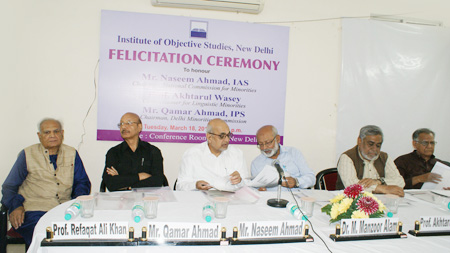
L-R: Prof. Refaqat Ali Khan, Vice-Chairman, IOS; Mr. Qamar Ahmad, IPS, Chairman, Delhi Minorities Commission; Mr. Naseem Ahmad, IAS, Chairman, National Commission for Minorities; Dr. M. Manzoor Alam, Chairman, IOS; Prof. Akhtarul Wasey, Commissioner for Linguistic Minorities; Prof. Z.M. Khan, Secretary General, IOS
New Delhi, March 18: The Institute of Objective Studies (IOS), organised a ‘felicitation ceremony’ to honour Mr. Naseem Ahmed, IAS, on his appointment as Chairman, National Commission for Minorities, Prof. Akhtarul Wasey, who joined as Commissioner for Linguistic Minorities in India and Mr. Qamar Ahmad, IPS, on his appointment as Chairman, Delhi Minorities Commission at the Conference Hall of the IOS here.
Presiding over the function, the Chairman of the IOS, Dr. M. Manzoor Alam readily accepted Prof. Akhtaraul Wasey’s suggestion to take the notice of the U.P. government’s indifference to the plight of Urdu-medium schools and the present state of affairs in the Urdu-medium schools in Delhi where a fairly good number of teachers, vice-principals and principals possessed no knowledge of Urdu.
Referring to the endeavours of the IOS in the field of research and analysis of the issues pertaining to the minorities, particularly Muslims, he lamented that the institutions and organisations engaged in the uplift of the community had not made full use of the outcome of these studies. He highlighted the lack of interest among a host of Muslim intellectuals and public figures who did not even bother to acknowledge his letters, let alone reply to them. But, it would not prevent him from writing to them in future, he said.
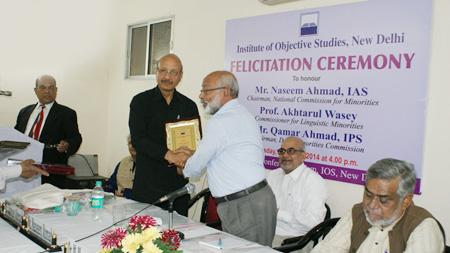
Dr. M. Manzoor Alam presenting memento to Mr. Qamar Ahmad, IPS, Chairman, Delhi Minorities Commission
Explaining the concern of the IOS for Muslims, he recalled the meeting of a 9-member delegation led by the ex-Chief Justice of India, Justice A.M. Ahmadi of which he himself was a member, with the Prime Minister, Dr. Manmohan Singh, he said that a set of 17 books published by the Institute was presented to him. The meeting resulted in the constitution of the Sachar Committee to go into the socio-economic and political backwardness of the Muslims.
He also informed that a set of 34 books published by the IOS was presented to Justice Rajinder Sachar to help him understand the status of Muslims as a community. Unveiling the future plan of the IOS, he said that the study of the place of Muslims in the context of global scenario would be undertaken. He sought the cooperation of Muslim intellectuals, institutions and organisations in the study of the status of the world, India and the Muslims in 2050.
Introducing the three dignitaries, the Secretary-General of the IOS Prof. Z.M. Khan held that they excelled in their fields. While Mr. Naseem Ahmed proved his acumen as an able administrative officer, Mr. Qamar Ahmad left an indelible imprint on Delhi as a competent police officer. He described Prof. Akhtarul Wasey as a prolific writer, scholar of Islamic studies, thinker and a perfect orator. He was all praise for Prof. Ishtiyaq Ahmad, recently appointed as Vice-chancellor of Magadh University, Bodh Gaya (Bihar), who had been closely associated with the activities of the IOS.
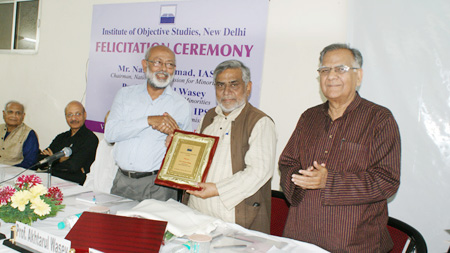
Dr. M. Manzoor Alam presenting memento to Prof. Akhtarul Wasey, Commissioner for Linguistic Minorities
Prof. Ishtiyaq Ahmad also introduced the three to the audience. Mr. Qamar Ahmad in his address said that after retirement from the police service, he joined a private company to look after security and transportation management. After assuming charge as Chairman of Delhi Minorities Commission, he had set himself for the task of ensuring equal opportunities to the Muslims. He believed that his experience as a police officer would stand him in good stead as far as the problems of Muslims of Delhi were concerned.
He informed that one district of Delhi with a big concentration of Muslims had been chosen to monitor the implementation of the Prime Minister’s 15-point programme. While advising Muslims not to feel neglected, he said that he would do everything within the powers conferred on him to ensure their uplift. He admitted that though the Minorities Commission was a recommendatory body, a lot could still be done through various instruments like NGOs. He informed that about 16 NGOs were engaged in imparting training to the youth in computer applications and mobile phone repairing.
Prof. Akhtarul Wasey, Commissioner for Linguistic Minorities in India, said that the Commission was appointed in 1957 in pursuance of provisions under the Indian Constitution. He observed that the report of the Commission was annually tabled in both Houses of Parliament for debate. He explained that a person from a linguistic majority could turn into a linguistic minority when he or she enters another state inhabited by a population speaking a different language.
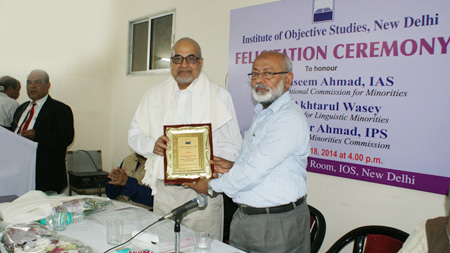
Dr. M. Manzoor Alam presenting memento to Mr. Naseem Ahmad, IAS, Chairman, National Commission for Minorities
He made an impassioned plea to the Chairman of the IOS to take notice of the disinterest shown by the government of U.P. to the Urdu-medium schools that were running without teachers. He also cited the case of Delhi where Urdu-medium schools had such teachers, vice-principals and principals did not know Urdu. He urged the IOS to provide inputs about them, so that the Commission could act on it. Lauding IOS as the only Muslim think tank in its own right in India, he remarked that at a time when government institutions had virtually become non-functional, the Institute could positively contribute to the study of the condition of the community.
Newly-appointed Chairman of the National Commission for Minorities, Mr. Naseem Ahmed, pointed out that for a long period during his career he remained anonymous. He said that he was even unaware of those who were instrumental in his new assignment. He assured that he would spare no efforts to do whatever he could in his capacity as the head of the minorities’ panel. He favoured voicing demands of the community repeatedly so as to be heared. He recalled his association with the IOS, particularly with regard to its lead to organise discussions on important issues like waqf amendment legislation and the anti-communal violence bill. He emphasised the need for delivery of ideas, views and care not to let the community’s voice get fragmented. He sought time to get down to taking stock of the situation.
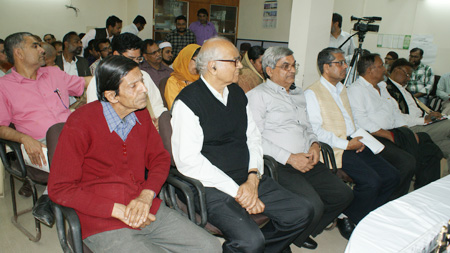
A view of audience
Earlier, each of the honoured guests was presented with a bouquet, a shawl and a memento.
The felicitation ceremony opened with the recitation of the Holy Qur’an by Dr. Nakhat Husain Nadvi. While the proceedings of the function were conducted by Mr. Mushtaq Ahmad, senior advocate, Supreme Court of India, Prof. Afzal Wani, Assistant Secretary General of the IOS proposed a vote of thanks. Notable among those who attended the function included Prof. Refaqat Ali Khan, Vice Chairman of the IOS, Prof. Hasina Hashia of Jamia Millia Islamia, prominent citizens, academics and social activists.
Go Back